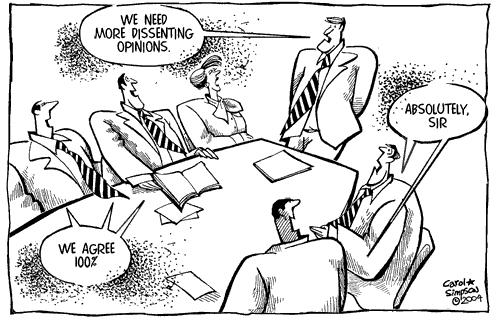Disagree at your own risk
In my opinion, those organizations that encourage disagreement have a higher likelihood of success. Why? Because encouraging team member to voice their disagreement brings out alternative ideas, enhancements and perspectives that management didn’t consider or overlooked. Be careful because most or

In my opinion, those organizations that encourage disagreement have a higher likelihood of success. Why? Because encouraging team member to voice their disagreement brings out alternative ideas, enhancements and perspectives that management didn't consider or overlooked.
Be careful because most organizations don’t have a culture that supports open disagreement. Once management makes their decision, they actively resist any feedback or challenges to their ideas. In these organizations, if a person goes public with their criticism, they risk being fired. The result is that management forces the disagreement underground which destroy's whatever culture the company had.
Let me clarify – I’m not saying that everyone should just walk around and criticize the ideas and decisions of others.
No one wants to be part of a team that has that one person who sees their role as the “devil advocate” and always disagrees.
At the same time, don’t hold back if you truly disagree with the direction that is being taken. Those that keep it to themselves have no leg to stand on to complain about the outcome. You owe it to yourself, your team and the organization to raise your concerns.
If you disagree with a decision, I would suggest you:
- Start off by saying something supportive of the idea
- Then mention your concern in the form of a question such as “I’m sure you considered X alternative. Is there a reason it got rejected?”
- Then pitch your suggestion.
Do you have any good stories of what happened when someone disagreed with their boss? I would love to hear them …




